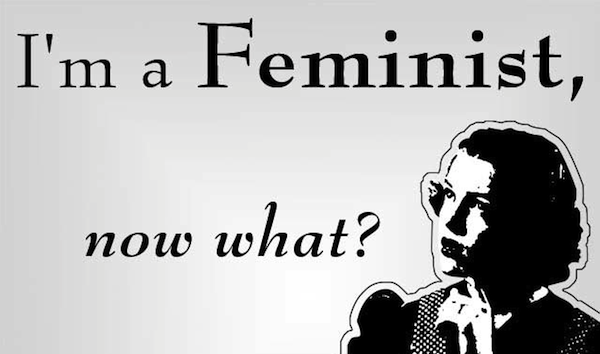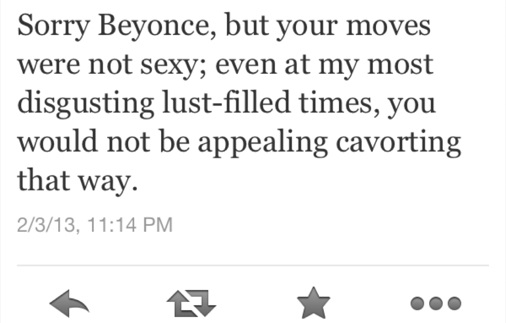For the majority of my grown up life, I’ve been deeply skeptical of feminism. Mind you, I don’t want women to be barefoot and pregnant, despite my blog title. I believe that women and men are equal in value, even if they are fundamentally different in nature. In fact, one of my earliest college memories was a moment in Lit Trad IV, when I nearly jumped over the tables in a fit of rage after a boy insisted that “Sonia is a filthy whore.”
When he said that, my cheeks went red like I had just been slapped, and I kind of felt like I had. “She’s selling her body to provide food for her siblings,” I said in a low, dangerous tone. My professor looked at me in alarm. I probably looked a little frightening, with my hands planted on either side of my open book, palms pressed into the table, fingers splayed, my whole body tilting slightly forward. All I remember is watching the kid watch me, seeing his lip curl in disgust, and mentally thinking, don’t say what I know you’re going to say. Just don’t do it. Don’t be that person.
But he did say it. “She’s still a dirty whore. Doesn’t matter why she’s a slut. A slut’s a slut.” I fired back, “so if you were her brother, would you refuse to eat the food she buys with that money, then? Would you help her find other work? Would you work yourself so she didn’t have to sell her body?” He smiled then, and said slowly, “No. I’d eat the food, then I’d slap her across the face and tell her that her sin is disgusting in the eyes of God and man.”
It was at that point that my professor bodily removed me from the class, since I was halfway over the table with my hands balled into fists. Outside the class, she hugged me and told me that she completely understood and was also upset, but there were some people who only want to provoke and condemn, and words were wasted on them.
He was the exception, though, not the rule. I was sure of it. I was sure of then and I’ve been sure of it ever since. And seeing my husband do battle with the feminists in the years between that moment and this have left me without one iota of sympathy for anything that reeked of feminism. He’s been accused of misogyny more times than I can count because he’s a straight white Catholic male. I’ve been sure, just sure, that feminists see sexism wherever they want to, that it’s not really there, not really, not anymore. And women who talk about sexism in language, well, they should hang out with this girl:
(start it at :50 to avoid the “B” word)
http://www.youtube.com/watch?v=Hb5_9cDY3ysLately I’ve had that assurance rattled. Mostly because my online BFF, Kass-tacular, has been having some feminist angst. I sort of brushed it off at first, like, oh, she’s just moved to NYC and is swinging the pendulum in reaction to her ORU days, just like I’m swinging left now in reaction to my uber-right days. It happens to us all, it’ll correct itself, it’s an Aristotelian phase.
So when the Patrick Madrid Twitter-swear-gate happened, and the focus was immediately on the perceived sexism behind his tweets, I brushed it off too. I really didn’t think there was anything sexist behind him calling out women for swearing. After all, as I told Kassie, he was born in a different era, when men didn’t curse in front of women because chivalry, that’s why. And that’s dead and gone and makes me sad because I hate trying to wrestle doors open on my own with a baby on my hip and two toddlers in a double stroller.
Then two things happened. Clare Coffey pointed out, on Twitter, that “the idea that it’s somehow okay to specifically call out women for swearing is close to the definition of sexism.” Cari Donaldson, in a separate forum, pointed out that the language he used was specifically based on appearance. Jess has a good run-down of the conversation on CathoFeminism if you want to see all the tweets about the topic of women swearing. Some of the descriptions used about swearing female Catholic bloggers were “disgusting,” “major turn-off,” and “(they) have really let themselves go.”
This has been making me uneasy. Ever since this happened, I’ve started noticing the same trend…everywhere. Men judging women for what they do based on “attractiveness.” Women judging women for what they do based on “attractiveness.” Me judging myself for what I do or write based on “attractiveness.”
Last night it all kind of blew up for me when the tweets and status updates about Beyonce’s halftime performance started pouring in. Here’s what I wrote on facebook:
I did not watch the halftime show or the game, thank God. But I’m appalled by these status updates and tweets. Everyone commenting on how “disgusting” or “not sexy” or “unappealing” Beyonce was is part of the problem. The problem of judging a woman based on her appearance. What happened to objective morality? What happened to virtue? Why is no one appealing to right or wrong, but only their own sense of what’s “hot?” Shaming someone into behaving a certain way by telling her she isn’t attractive is what got us here in the first place, where women feel they have to cavort half-naked on a stage in order to be deemed worthy of praise.
Some of my friends seemed to think that I was defending Beyonce’s apparently obscene show. I wasn’t. What I was trying to point out is that turning off the TV or using this as a moment to teach your children about virtue, modesty, our culture’s objectification of women (which women are in some ways responsible for, y’all) is one thing. I’d argue that it’s a good thing. This:
is something quite different, and something very bad.
And it’s pretty much the same thing that happened on Twitter.
It is wrong to call out a woman for doing something because it’s unattractive. This type of behavior has nothing to do with the objective ideal of beauty. It’s all about trying to get a woman to change her behavior because you (or someone else) doesn’t find it attractive.
It’s wrong because that is the same attitude that got us here. Men and women have been changing the expectations for women’s behavior for years, maybe even decades, maybe even centuries based on what’s attractive. Men are not held to the same standard. No one says to a boy, “don’t cuss, it’s not attractive.” They say, “don’t cuss, it’s wrong.” (Personally, I say, “don’t cuss, because you don’t understand what you’re saying or how and when to use those words.” But then, I’m raising heathens.) But it’s so common to hear someone say to a little girl, “don’t cuss, it’s ugly” that I didn’t even blink twice at it on Twitter.
This is a problem for a lot of reasons. It’s a problem because we’re holding our boys and girls to two different standards of morality based on a subjective standard instead of an objective truth. If you’re thinking, “oh Calah, stop overreacting. It’s just a figure of speech, it doesn’t effect real life,” think again. A Catholic school in New Jersey just implemented a no swearing rule for girls only.
It’s a problem because by carelessly using this kind of language, we are still teaching our girls that their worth is measured by how they appear. The criticism of women swearing was not concerned with an objective sense of right or wrong. It was a criticism that relied entirely on the premise that swearing negatively affects a man’s attraction to women. Patrick Madrid literally said, “when women swear, I find them less attractive.” And that was echoed by men and women all over Twitter. “Yes, yes, it’s so disgusting for a woman to have a potty mouth! Yuck!”
This is disturbing. Now that I’m really seeing it, I’m really disturbed by it. Why is this okay? Why is it permissible for anyone to judge a woman’s actions based on how it affects her level of appeal? It’s just like the “pants are for sinners” post, where it’s ostensibly about the relative morality of women’s fashions, but if you scratch the surface you see that what’s really being said is, “I like to see a woman in a skirt, and since I’m a good, God-fearing man, you women owe me that visual pleasure. So put a skirt on and I’ll find you more attractive!”
For many years, I tortured myself over my appearance. I still do. Whether we want to admit it or not, our culture shapes women to believe that their value is measured by how they look. And it’s not just the secular culture. Religious cultures do it too. Pat Robertson thinks that women whose husbands drink are at fault because they’ve let themselves go. There it is again, “let themselves go.” Like I’ve let myself go with my cursing? Somehow, I’m unable to torture myself over that one. It’s jarringly liberating, in a way. After 28 years, I’m finally at a place where the fact that a man I’ve never met finds me unattractive because I swear fails to shame me into a bout of mental self-laceration. Two years ago, it would have been a different story.
I do not want my daughter to grow up in a world where the boys and men around her constantly judge her morality in terms of physical attraction. I don’t want her to hear things like, “waiting till marriage is sexy” or “it’s a turn-off when girls smoke”. I want her to hear things like, “your virtue is worth too much to throw away on someone who is not going to commit his life to you.” I want her to hear someone say, “smoking damages your body, and you’re too precious to damage for recreation.” I want her to grow up in a world where men and women talk about issues of virtue and modesty in terms of objective truth, not in terms of sex appeal. I don’t want my daughter to be shamed into acting virtuously because if she doesn’t, some anonymous internet guy is going to tweet about what a turn-off she is. I don’t want my daughter to spend the better part of three decades torturing herself over her appeal to men before she can finally get enough distance to see things objectively. She deserves better than that. And if I ignore these things because I’m tired of feminism, or I think it’d be swell if there were more chivalry around, I’m failing her.













